harrow公学1
英国九大公学

英国九大公学英国有许多著名的私立学校,其中最闻名于世的就是英国九大公学。
这九所学校分别是伊顿公学、哈罗公学、温彻斯特公学、查特豪斯公学、威灵顿公学、杜伦公学、罗斯学院、马尔伯勒公学和雾修斯公学。
伊顿公学是其中最为知名的一所学校。
其创立于1440年,位于英格兰伯克郡的温莎。
伊顿公学以培养英国的上层社会人才而闻名于世。
它的课程以教授人文科学为主,包括英语、历史、地理等。
此外,学校还注重培养学生的音乐和体育兴趣,因此伊顿公学也以其优秀的合唱团和橄榄球队而闻名。
哈罗公学是英国九大公学中最古老的一所,创立于1572年。
它位于牛津大学城。
哈罗公学的校训是“道德修养”,强调培养学生的品德和素质。
它的课程设置相当丰富,除了常规学科外,还包括拉丁语、古希腊语等传统学科。
哈罗公学的毕业生们在各行各业都有出色的表现,无论是政界、商界还是文化界,都有哈罗公学的身影。
温彻斯特公学成立于1382年,是英国九大公学中唯一一所创立于中世纪的学校。
它位于温彻斯特市,是一所男子学校。
温彻斯特公学非常重视学生的学术表现,学校为此提供了一系列的支持措施,比如小班教学、学术辅导等。
此外,该校还鼓励学生积极参与体育、艺术和音乐等课外活动,培养全面发展的学生。
查特豪斯公学创立于1608年,位于剑桥市。
该校是一所男子学校,以其严格的学术要求和高水平的教学而闻名。
学校的图书馆收藏着大量珍贵的书籍和文献,为学生提供了很好的学习资源。
此外,查特豪斯公学也重视学生的体育和社交发展,鼓励学生参与各种活动,提高团队合作和领导能力。
威灵顿公学成立于1853年,位于英格兰萨默塞特郡的威灵顿。
该校是一所男女混校,以其开放和国际化的教育理念而闻名。
威灵顿公学的师资力量雄厚,包括了来自各个领域的优秀教师。
学校注重学生全面发展,提供丰富多样的学科和课外活动,同时也鼓励学生参与公益活动,培养他们的社会责任感。
杜伦公学创立于1614年,位于英格兰县杜伦市。
该校是一所男女合校,注重培养学生的个性和思辨能力。
英国高中留学学校排名前十有哪些

英国高中留学学校排名前十有哪些在选择英国高中留学学校时,学校的排名是一个重要的参考因素。
以下是根据最新的信息,详细、具体且生动地介绍英国高中留学学校排名前十的学校。
1. 威斯敏斯特公学(Westminster School)威斯敏斯特公学是英国古老的学校之一,成立于1382年。
学校地处伦敦中心,拥有优雅的建筑和丰富的历史。
威斯敏斯特公学着重培养学生的学术能力和全面发展,以优秀的教学和大学录取率著名。
温德米尔学校位于英格兰伯克郡,是一所寄宿制女子学校。
学校的环境幽静,悠久的历史为学生提供了丰富的学习机会。
该学校在科学、艺术和人文领域拥有卓越的学术声誉。
3. 艾顿公学(Eton College)艾顿公学是英国著名的男子公学,毕业生包括英国王室成员和政商界精英。
学校位于温莎城堡旁,校园优美宏伟。
艾顿公学注重培养学生的领导力和团队合作能力。
4. 哈罗公学(Harrow School)哈罗公学也是一所有着悠久历史的男子公学,位于伦敦西北部。
学校以其优秀的学术水平、严谨的纪律和卓越的艺术与体育项目而闻名。
5. 圣保罗公学(St. Paul's School)圣保罗公学是伦敦的一所男子学校,其教育历史可追溯到16世纪。
学校拥有优秀的师资力量,提供高质量的学术教育和丰富的课外活动。
6. 温布尔登学院(Wimbledon College)温布尔登学院是一所男子教会学校,位于伦敦西南部。
学校提供综合教育,注重学生的道德价值观和社交责任感的培养。
7. 史托维公学(Stowe School)史托维公学位于英格兰白金汉郡,是一所寄宿和走读制学校。
学校注重培养学术能力和创造力,拥有卓越的艺术和体育设施。
8. 韦灵顿公学(Wellington College)韦灵顿公学位于伯克郡,是一所学术声誉卓越的男子学校。
学校强调素质教育和领导力培养,学生在校期间参与丰富的课外活动。
9. 默奇公学(Magdalen College School)默奇公学是牛津郡一所非常有声望的男子学校,成立于1480年。
英国私立中学排名大全

英国私立中学排名大全英国私立中学一直以其优质的教育资源和丰富的教学经验而闻名于世。
在众多的私立中学中,有一些学校因其卓越的教学质量和优秀的师资力量而备受关注。
下面将为大家介绍一些英国私立中学的排名情况,希望对家长和学生们在选择学校时有所帮助。
首先,伊顿公学(Eton College)是英国最著名的私立男子中学,建立于1440年,培养了无数的政治家、企业家和学者。
其教学质量一直位居英国私立中学之首,学校拥有一流的师资力量和丰富的教学资源,被誉为“英国教育的摇篮”。
其次,哈罗公学(Harrow School)也是英国著名的私立男子中学,建立于1572年,是伊顿公学的主要竞争对手。
学校不仅在学术上有着卓越的表现,而且在体育、音乐和艺术方面也备受赞誉。
学校注重学生的全面发展,培养学生的领导力和团队合作精神。
除了男子中学,英国的私立女子中学也有着丰富的教学资源和优质的教学质量。
惠灵顿公学(Wellington College)是英国著名的私立女子中学之一,建立于1853年,学校注重学生的个性发展和自主学习能力的培养,学术氛围浓厚,教学质量一直名列前茅。
此外,圣保罗女子学校(St. Paul's Girls' School)也是英国著名的私立女子中学,建立于1904年,学校以其严谨的学术氛围和优秀的师资力量而闻名。
学校注重学生的学术能力和创造力的培养,培养了许多杰出的女性领袖。
除了上述几所私立中学,英国还有许多其他优质的私立中学,如温彻斯特公学(Winchester College)、威斯敏斯特公学(Westminster School)等,这些学校在学术、体育、艺术等方面都有着卓越的表现,备受家长和学生们的青睐。
总的来说,英国私立中学在教学质量和教学资源方面都有着独特的优势,学校不仅注重学生的学术能力,而且注重学生的全面发展。
希望家长和学生们在选择学校时能够根据自身的需求和兴趣,选择一所适合自己的私立中学,为未来的发展打下坚实的基础。
★留学院校★ 【英国】-哈罗公学 Harrow School

1 High Street
Harrow-on-the-Hill
Middlesex
HA1 3HT
United Kingdom
T: +44 (0)20 8872 8007
admissions@
哈罗公学在伊丽莎白一世特批下,建校于1572年,是世界最出名的中学之一,历届的校友包括7位英国首相,印度的第一任总统潘迪特.尼赫鲁,诗人拜伦等。
学校占地400公顷,教学注重于以学生的兴趣为主,通过学校教师的引导来帮助学生完成与他们能力想匹配的各种考核。
学校的系部有自己的教案设置,协助学生完成自己的学业。
所有的哈罗毕业生都考上大学或者是进入医学院。
他们要么是进入牛津和剑桥,要么是进入美国顶尖的大学,每五名学生中就有一名进入顶尖的大学。
学校的课余活动也很丰富,音乐部每年有60场音乐会,每一年有将近14场戏剧表演和其他的系部,有些戏剧表演是用外语来表演。
院校的课外活动是由学校的院系组织的,用外语来表演。
学校的宗旨就是希望学生能够让其学术的进步和在其他领域的进步是一样出色的。
上海八大贵族学校

上海八大贵族学校1、上海惠灵顿国际学校学费32.8万/年。
惠灵顿国际学校位于上海前滩,主要招收外籍学生,学费在上海所有国际学校中排名第一。
惠灵顿公学来源于英国,是英国维多利亚女王于1856为惠灵顿公爵而建的,于1859年1月29日开学。
2、上海德威国际学校学费32.5万/年。
上海德威外籍人员子女学校成立于2003年,目前在上海有浦东和浦西两个校区,招收从幼儿园到高中的学生,目前共有超过1500名学生就读。
德威公学(Dulwich)创立于1619年,英国校区位于伦敦,每年有10-15%的毕业生入读牛津、剑桥以及美国的常春藤联盟院校。
上海德威在2021年的毕业录取中约有6名学生拿到名校录取,并有三分之一的学生达到高分毕业(IB课程40分及以上,45分为总分)。
3、上海英国学校学费32.15万/年。
上海英国学校又称上海诺德安达国际学校,于2002年成立于上海,作为英国NordAnglia教育集团的成员,上海英国学校为12个月到18岁的孩子提供英国教育体系的课程。
4、上海哈罗国际学校学费31.98万/年。
上海哈罗国际学校非常新,于2016年才开始对外招生,目前学校有大约680名学生,年龄从3岁到18岁不等。
大名鼎鼎的哈罗公学(HarrowSchool)是英国九大公学之一,英国校区位于伦敦西北角,是和伊顿齐名的顶级私校。
目前,哈罗已在曼谷、香港、北京、上海、深圳、海口成功开办和运营了多所哈罗国际学校。
5、上海美国学校学费27.7万/年。
上海美国学校成立于1912年,是上海规模最大的国际学校,拥有来自40个国家的3000多名学生。
上海美国学校开设幼儿园到12年级的课程,以美国的核心课程为基础。
上海美国学校有浦东和浦西两个校区。
上海美国学校由美国驻华大使馆开办,录取结果相当优秀,98%的毕业生能够进入世界知名大学,是上海最顶级的国际学校之一。
6、上海协和国际学校学费27万/年。
上海协和国际学校成立于1998年,跟上海美国学校并称上海最好的两所美式国际学校。
世界著名中学办学之道
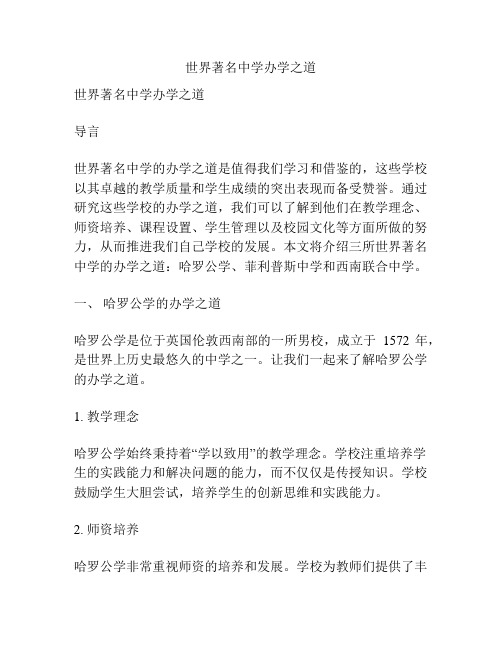
世界著名中学办学之道世界著名中学办学之道导言世界著名中学的办学之道是值得我们学习和借鉴的,这些学校以其卓越的教学质量和学生成绩的突出表现而备受赞誉。
通过研究这些学校的办学之道,我们可以了解到他们在教学理念、师资培养、课程设置、学生管理以及校园文化等方面所做的努力,从而推进我们自己学校的发展。
本文将介绍三所世界著名中学的办学之道:哈罗公学、菲利普斯中学和西南联合中学。
一、哈罗公学的办学之道哈罗公学是位于英国伦敦西南部的一所男校,成立于1572年,是世界上历史最悠久的中学之一。
让我们一起来了解哈罗公学的办学之道。
1. 教学理念哈罗公学始终秉持着“学以致用”的教学理念。
学校注重培养学生的实践能力和解决问题的能力,而不仅仅是传授知识。
学校鼓励学生大胆尝试,培养学生的创新思维和实践能力。
2. 师资培养哈罗公学非常重视师资的培养和发展。
学校为教师们提供了丰富的培训机会,包括定期的教学研讨会、教学观摩和一对一的指导。
学校还鼓励教师们参加学术会议和研究项目,提升他们的专业水平。
3. 课程设置哈罗公学的课程设置非常丰富多样,既注重培养学生的学术能力,也注重培养学生的综合素质。
学校开设了各类学科,包括语言、科学、艺术、体育等。
此外,学校还提供丰富多样的选修课程,满足学生的个性化需求。
4. 学生管理哈罗公学实行严格的学生管理制度,要求学生遵守校规校纪。
学校鼓励学生自律自强,培养学生的责任感和纪律意识。
学校还注重学生的心理健康教育,提供心理咨询和支持服务,确保学生能够全面发展。
5. 校园文化哈罗公学倡导多元文化的校园环境,鼓励学生尊重不同文化和背景的人。
学校组织各类文化活动和交流活动,让学生有机会接触不同的文化,培养学生的国际视野和跨文化交流能力。
二、菲利普斯中学的办学之道菲利普斯中学成立于1792年,位于美国马萨诸塞州安多弗市,是一所优秀的寄宿制中学。
让我们一起了解菲利普斯中学的办学之道。
1. 教学理念菲利普斯中学强调学术和品德教育的结合。
英国贵族学校排名

英国贵族学校排名引言:英国的贵族学校在全球享有极高的声誉和知名度。
这些学校提供了一流的教育和学术环境,同时也秉持着传统的价值观和教育理念。
在英国的贵族学校中,学生们可以接受到全面的教育,培养自身的领导能力和社交技巧。
本文将介绍英国贵族学校排名,包括一些著名的贵族学校以及它们的特点。
1. 伊顿公学(Eton College)伊顿公学位于英国伯克郡,创立于1440年,是英国最负盛名的贵族学校之一。
伊顿公学培养了许多杰出的国家领导人、学者和艺术家。
这所学校以严格的学术要求和强调社会责任感而闻名。
伊顿公学提供广泛的课程选择,包括人文科学、自然科学、艺术和体育等领域,并注重学生的全面发展。
2. 温彻斯特公学(Winchester College)温彻斯特公学创建于1382年,是英国历史最悠久的学校之一。
它位于赫特福德郡,是一所男子寄宿学校。
温彻斯特公学以追求卓越的教育标准而著称,注重学术研究和学生的个人成长。
这所学校着重培养学生的独立思考能力和批判性思维,鼓励学生积极参与课堂讨论和社会活动。
3. 哈罗公学(Harrow School)哈罗公学创立于1572年,位于伦敦西北部的哈罗。
它是一所男子寄宿学校,培养了许多知名的政治家、商人和文化名人。
哈罗公学以严格的学术要求和独特的教学方法而闻名,注重发展学生的领导能力和独立思考能力。
这所学校还有一个强大的校友网络,为学生提供广阔的发展机会。
4. 威灵顿公学(Wellington College)威灵顿公学创建于1853年,位于伯克郡的兰开勋爵庄园。
它以其独特的教学理念和强调全人教育而闻名。
威灵顿公学注重发展学生的领导能力和社交技巧,鼓励学生参与各种体育、艺术和社会活动。
这所学校还与世界各地的学校建立了合作伙伴关系,为学生提供更广阔的学术和文化交流机会。
5. 纳菲尔德协会学校(The Nafferton Association Schools)纳菲尔德协会学校是一所位于英国东北部的寄宿学校联盟。
英国哈罗公学申请介绍

英国哈罗公学申请介绍哈罗公学(Harrow School)是一所位于英国伦敦西北部哈罗区的知名男子私立寄宿学校,创立于1572年,是英国传统的公学之一。
该学校以严谨的学术教育和全面的培养发展闻名,被誉为英国公学教育的典范之一。
申请流程:1. 填写申请表:申请人需要向学校提交申请表格,填写个人信息、学历背景、家庭背景等相关资料。
2. 面试:通过初步筛选的申请人将被邀请参加面试,面试内容主要是对学术能力、兴趣爱好和性格特点等方面的评估。
3. 入学考试:申请人需要参加学校组织的入学考试,包括英语、数学和语文等科目,以评估申请人的学术能力水平。
4. 提供推荐信:申请人需要提交来自老师和其他专业人士的推荐信,以证明其學業和品德方面的优秀表现。
5. 面试家庭访问:部分申请人会被邀请到学校进行家庭面试和校园参观,以相互了解学校和家庭之间的适应情况。
6. 录取通知:学校通过综合评估申请人的面试表现、学术成绩和推荐信等情况,最终决定是否录取。
申请要求:1. 年龄限制:申请者的年龄一般在13-18岁之间。
2. 学术要求:申请者需要提供近几年的学业成绩单,学校将综合考虑申请者的学术能力和发展潜力。
3. 语言要求:申请者需要具备良好的英语口语和书写能力,如果母语非英语需要提供英语水平证明,如雅思或托福成绩单。
4. 推荐信:申请者需要提供至少两封来自老师和指导人员的推荐信,评价其学术能力、品德和对哈罗生活的适应能力。
学费和奖学金:哈罗公学的学费较高,每年学费约为£42,000起。
学校提供一些奖学金,可用于部分或全部减免学费。
这些奖学金根据学术能力、艺术才华、体育能力和潜在领导能力等方面进行评定。
总结:哈罗公学是一所享有盛誉的英国男子私立寄宿学校,申请过程相对较为严格。
申请者需要在学术成绩、语言能力、面试表现和推荐信等方面具备一定的优势才能有更大的机会被录取。
学费较高,但学校也提供部分奖学金以帮助优秀的申请者。
英国九大公学

英国九大公学英国九大公学是指英国境内排名前九位的顶级中学,这些学校具有悠久的历史和卓越的教育传统。
它们提供高水平的教学和广泛的学科选择,培养学生全面发展。
下面将逐一介绍这九所著名的英国公学。
1. 埃顿公学(Eton College)埃顿公学是英国最负盛名的男子公学之一,位于伯克郡的温莎。
该学校成立于1440年,至今已有超过五个世纪的历史。
埃顿公学以培养精英人才而著称,出了众多政治家、企业家和文化名人。
2. 温彻斯特公学(Winchester College)温彻斯特公学成立于1382年,是著名的男子公学,位于汉普郡的温彻斯特。
该学校以其严谨的学风和优秀的教学质量而闻名,培养了很多优秀的学生。
3. 哈罗公学(Harrow School)哈罗公学是英国最古老的男子公学之一,成立于1572年。
位于伦敦附近的哈罗,是一所世界知名的学校。
哈罗公学培养了无数杰出的领袖人物,不仅在学术上取得了优异的成绩,还在体育和文化领域享有盛誉。
4. 韦伯斯特公学(Westminster School)韦伯斯特公学创办于1179年,位于伦敦市中心威斯敏斯特区。
作为英国历史最悠久的学校之一,韦伯斯特公学一直以来提供高质量的教育,并对塑造英国政治和文化产生了巨大影响。
5. 威灵顿公学(Wellington College)威灵顿公学成立于1859年,位于伯克郡的塞普顿。
该学校以其卓越的教学质量和广泛的课程选择而闻名,为学生提供了多个学科和活动的机会。
6. 耶稣学校(Harrow School)耶稣学校是一所高声望的共学学校,成立于1553年,位于汉普郡的耶稣城。
该学校教育素质极高,鼓励学生全面发展,并提供一系列的学术、体育和文化活动。
7. 纽特公学(Radley College)纽特公学成立于1847年,坐落在牛津郡的纽特村。
该学校为男生提供严谨的学术教育,并注重培养学生的素质和领导能力。
8. 万德沃思公学(Wycombe Abbey)万德沃思公学是一所知名的女子公学,成立于1896年,位于白金汉郡的万德沃思。
英国高中贵族学校

在英国的公学体系中,有著名的九大公学。
保持自己的个性是公学和它的每一个学生笃守的信条。
因此,公学从古到今始终保持着一些与众不同的特征。
公学大多喜欢保持自己的古老风貌。
除了前大家熟知的哈罗、伊顿公学外,再来领略一下其他七所公学的风采。
哈罗公学Harrow School英国首都伦敦,偶然可以看到这么一群年轻的男生,他们身穿雪白的衬衣,外着天蓝色的西装外套,英俊潇洒,自信十足。
更引人注目的是人人头上那顶带着深蓝丝带的英式硬草帽(有时候会是黑礼服配英式高礼帽及手杖),这群孩子必定来自著名的哈罗公学(Harrow School)。
哈罗公学,是贵族学校中的佼佼者,英国贵族教育体系中的明珠。
即使面临数万英镑一年的高昂学费,世界各地那些腰缠万贯的家长,依然想尽办法让自己的儿子(女儿是不行的,因为哈罗是男校)戴上那顶哈罗草帽。
对他们来说,或许只要哈罗公学愿意接受,金钱不是问题。
赋予哈罗公学神秘光环的,不仅有辉煌的历史与传统,也有大英帝国依旧耀眼的软实力残光。
伊顿公学Eton College和哈罗公学一样,伊顿公学也只招男学生。
人数1480人,多于哈罗的800人。
某种程度上,伊顿公学比哈罗公学更得到英国传统人士的青睐。
首先其历史更加悠久,而且如上文所说,伊顿公学和英国王室贵族关系密切。
公学所在地就在著名的温莎堡旁边,从温莎堡上,历代英国国王都可以俯瞰这所贵族学校。
从象征意义上来说,伊顿的学生,是在英王的关怀下成长起来的。
也正因为如此,王室成员一般会选择伊顿而非哈罗,比如威廉王子和哈里王子都是伊顿公学的学生。
伊顿的校友录和哈罗相比同样群星灿烂,甚至略胜一筹。
也有一个专门的英语单词用于形容他们,那就是“伊顿佬”(Old Etonians)。
包括现任首相戴维·卡梅伦在内,历史上有 19位英国首相曾经穿过伊顿校服,这本来是英国国王乔治三世去世时人们为悼念他而穿的丧服,后来成为学校的校服,凸显了伊顿的保王色彩。
著名的伊顿人还包括雪莱、乔治·奥威尔、亨利·菲尔丁、凯恩斯和威灵顿公爵等人。
北京哈罗公学入学条件

北京哈罗公学入学条件
北京哈罗学校全称北京哈罗英国学校。
入学条件:
1、参加机考、笔试和面试。
2、插班生需提前与招生顾问预约考试时间。
3、符合以下条件学生,可获得优先录取资格:拥有优秀的听说读写基础,同时获得雅思、托福成绩者;担任学生干部或曾获得区级以上学科类三等奖以上者。
补充资料:
1、填好的申请表。
2、完成医疗信息记录。
3、英文老师填写的推荐信(需扫描发送至邮箱)。
4、过去两年的学生报告复印件。
5、学生护照照片页复印件。
6、父母双方护照照片页复印件。
7、全家签证、许可页面复印件(仅国际家庭提供)。
8、学生的一张护照照片。
9、申请费3500元。
Harrow丘吉尔在哈罗公学的日子
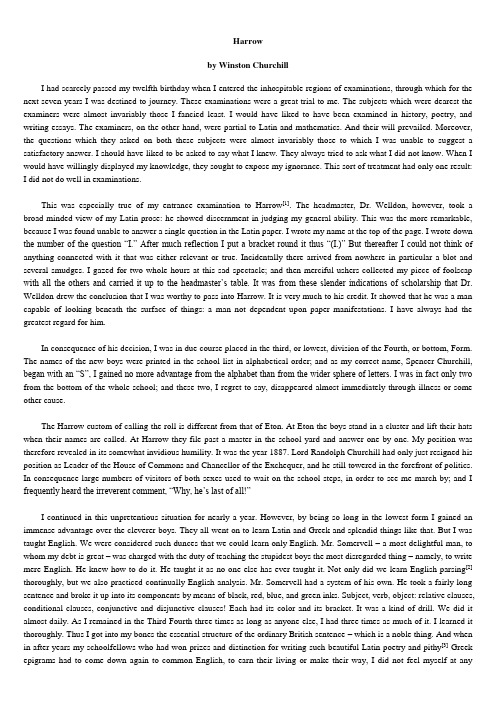
Harrowby Winston ChurchillI had scarcely passed my twelfth birthday when I entered the inhospitable regions of examinations, through which for the next seven years I was destined to journey. These examinations were a great trial to me. The subjects which were dearest the examiners were almost invariably those I fancied least. I would have liked to have been examined in history, poetry, and writing essays. The examiners, on the other hand, were partial to Latin and mathematics. And their will prevailed. Moreover, the questions which they asked on both these subjects were almost invariably those to which I was unable to suggest a satisfactory answer. I should have liked to be asked to say what I knew. They always tried to ask what I did not know. When I would have willingly displayed my knowledge, they sought to expose my ignorance. This sort of treatment had only one result: I did not do well in examinations.This was especially true of my entrance examination to Harrow[1]. The headmaster, Dr. Welldon, however, took a broad-minded view of my Latin prose: he showed discernment in judging my general ability. This was the more remarkable, because I was found unable to answer a single question in the Latin paper. I wrote my name at the top of the page. I wrote down the number of the question “I.” After much reflection I put a bracket round it thus “(I.)” But thereafter I could not think o f anything connected with it that was either relevant or true. Incidentally there arrived from nowhere in particular a blot and several smudges. I gazed for two whole hours at this sad spectacle; and then merciful ushers collected my piece of foolscap with all the others and carried it up to the headmaster’s table. It was from these slender indications of scholarship that Dr. Welldon drew the conclusion that I was worthy to pass into Harrow. It is very much to his credit. It showed that he was a man capable of looking beneath the surface of things: a man not dependent upon paper manifestations. I have always had the greatest regard for him.In consequence of his decision, I was in due course placed in the third, or lowest, division of the Fourth, or bottom, Form. The names of the new boys were printed in the school list in alphabetical order; and as my correct name, Spencer-Churchill, began with an “S”, I gained no more advantage from the alphabet than from the wider sphere of letters. I was in fact only two from the bottom of the whole school; and these two, I regret to say, disappeared almost immediately through illness or some other cause.The Harrow custom of calling the roll is different from that of Eton. At Eton the boys stand in a cluster and lift their hats when their names are called. At Harrow they file past a master in the school yard and answer one by one. My position was therefore revealed in its somewhat invidious humility. It was the year 1887. Lord Randolph Churchill had only just resigned his position as Leader of the House of Commons and Chancellor of the Exchequer, and he still towered in the forefront of politics. In consequence large numbers of visitors of both sexes used to wait on the school steps, in order to see me march by; and I frequently heard the irreverent comment, “Why, he’s last of all!”I continued in this unpretentious situation for nearly a year. However, by being so long in the lowest form I gained an immense advantage over the cleverer boys. They all went on to learn Latin and Greek and splendid things like that. But I was taught English. We were considered such dunces that we could learn only English. Mr. Somervell – a most delightful man, to whom my debt is great – was charged with the duty of teaching the stupidest boys the most disregarded thing – namely, to write mere English. He knew how to do it. He taught it as no one else has ever taught it. Not only did we learn English parsing[2] thoroughly, but we also practiced continually English analysis. Mr. Somervell had a system of his own. He took a fairly long sentence and broke it up into its components by means of black, red, blue, and green inks. Subject, verb, object: relative clauses, conditional clauses, conjunctive and disjunctive clauses! Each had its color and its bracket. It was a kind of drill. We did it almost daily. As I remained in the Third Fourth three times as long as anyone else, I had three times as much of it. I learned it thoroughly. Thus I got into my bones the essential structure of the ordinary British sentence – which is a noble thing. And when in after years my schoolfellows who had won prizes and distinction for writing such beautiful Latin poetry and pithy[3] Greek epigrams had to come down again to common English, to earn their living or make their way, I did not feel myself at anydisadvantage. Naturally I am biased in favor of boys learning English. I would make them all learn English; and then I would let the clever ones learn Latin as an honor, and Greek as a treat. But the only thing I would whip them for would be for not knowing English. I would whip them hard for that.I first went to Harrow in the summer term. The school possessed the biggest swimming-bath I had ever seen. It was more like the bend of a river than a bath, and it had two bridges across it. Thither we used to repair for hours at a time and bask between our dips eating enormous buns on the hot asphalt margin. Naturally it was a good joke to come up behind some naked friend, or even enemy, and push him in. I make quite a habit of this with boys of my own size or less. One day when I had been no more than a month in the school, I saw a boy standing in a meditative posture wrapped in a towel on the very brink. He was no bigger than I was, so I thought him fair game. Coming stealthily behind I pushed him in, holding on to his towel out of humanity, so that it should not get wet. I was startled to see a furious face emerge from the foam, and a being evidently of enormous strength making its way by fierce strokes to the shore. I fled, but in vain. Swift as the wind my pursuer overtook me, seized me in a ferocious grip, and hurled me into the deepest part of the pool. I soon scrambled out on the other side, and found myself surrounded by an agitated crowd of younger boys. “You’re in for it,” they said. “Do you know what you have done? It’s Amery, he’s in the Sixth Form. He is head of his House; he is champion at gym; he has got his football colors.” They continued to recount his many titles to fame and reverence and to dilate upon[4]the awful retribution that would fall upon me. I was convulsed not only with terror, but with the guilt of sacrilege[5]. How could I tell his rank when he was in a bath towel and so small? I determined to apologize immediately. I approached the potentate in lively trepidation[6]. “I am very sorry,” I said. “I mistook you for a Fourth Form boy. You are so small.” He did not seem at all placated by this; so I added in a most brilliant recovery, “My father, who is a great man, is also small.” At this he laughed, and after some general remarks about my “cheek”and how I had better be careful in the future, signified that the incident was closed.I have been fortunate to see a good deal more of him, in times when three years’ difference in age is not so important as it is at school. We were afterwards to be Cabinet colleagues for a good many years.It was thought incongruous that while I apparently stagnated in the lowest form, I should gain a prize open to the whole school for reciting to the headmaster twelve hundred lines of Macaulay’s “Lays of Ancient Rome” without making a single mistake. I also succeeded in passing the preliminary examination for the army while still almost at the bottom of the school. This examination seemed to have called forth a very special effort on my part, for many boys far above me in the school failed in it. I also had a piece of good luck. We knew that among other questions we should be asked to draw from memory a map of some country or other. The night before by way of final preparation I put the names of all the maps in the atlas into a hat and drew out New Zealand. I applied my good memory to the geography of that dominion. Sure enough, the first question in the paper was: “Draw a map of New Zealand.” This was what is called at Monte Carlo an en plein[7], and I ought to have been paid thirty-five times my stake. However, I certainly got paid very high marks for my paper.I was now embarked on a military career. This orientation was entirely due to my collection of soldiers. I had ultimately nearly fifteen hundred. They were all of one size, all British, and organized as an infantry division with a cavalry brigade. My brother Jack commanded the hostile army. But by a Treaty for the Limitation of Armaments he was only allowed to have colored troops, and they were not allowed to have artillery. Very important! I could muster myself only eighteen field guns –besides fortress pieces. But all the other services were complete –except one. It is what every army is always short of –transport. My father’s old friend, Sir Henry Drummond Wolff, admiring my array, noticed this deficiency and provided a fund from which it was to some extent supplied.The day came when my father himself paid a formal visit of inspection. All the troops were arranged in the correct formation of attack. He spent twenty minutes studying the scene –which was really impressive –with a keen eye and captivating smile. At the end he asked me if I would like to go into the army. I thought it would be splendid to command an army, so I said “Yes” at once; and immediately I was taken at my word. For years I thought my father with his expe rience and flair had discerned in me the qualities of military genius. But I was told later that he had only come to the conclusion that I was not clever enough to go to the bar. However that may be, the toy soldiers turned the current of my life. Henceforward all myeducation was directed to passing into Sandhurst, and afterwards to the technical details of the profession of arms. Anything else I had to pick up for myself.I spent nearly four and a half years at Harrow, of which three were in the army class. To this I was admitted in consequence of having passed the preliminary examination. It consisted of boys of the middle and higher forms of the school and of very different ages, all of whom were being prepared either for the Sandhurst or the Woolwich examination. We were withdrawn from the ordinary movement of the school from form to form. In consequence I got no promotion or very little and remained quite low down upon the school list, though working alongside of boys nearly all in the Fifth Form. Officially I never got out of the Lower School, so I never had the privilege of having a fag[8] of my own. When in the passage of time I became what was called “a three-yearer,” I ceased to have to fag myself, and as I was older than other boys of my standing, I was appointed in my House to the position of Head of the Fags. This was my first responsible office, and the duties, which were honorary, consisted in keeping the roster of all the fags, making out the lists of their duties and dates, and placing copies of these lists in the rooms of the monitors, football and cricket champions, and other members of our aristocracy. I discharged these functions for upwards of a year, and on the whole I was resigned to my lot.Meanwhile I found an admirable method of learning my Latin translations. I was always very slow at using a dictionary: it was just like using a telephone directory. It is easy to open it more or less at the right letter, but then you have to turn backwards and forwards and peer up and down the columns and very often find yourself three or four pages the wrong side of the word you want. In short I found it most laborious, while to other boys it seemed no trouble. But now I formed an alliance with a boy in the Sixth Form. He was very clever and could read Latin as easily as English. Caesar, Ovid[9], Virgil[10], Horace[11], and even Martial’s epigrams were all the same to him. My daily task was perhaps ten or fifteen lines. This would ordinarily have taken me an hour or an hour and a half to decipher, and then it would probably have been wrong. But my friend could in five minutes construe it for me word by word, and once I had seen it exposed, I remembered it firmly. My Sixth Form friend for his part was almost as much troubled by the English essays he had to write for the headmaster as I was by these Latin crossword puzzles. We agreed together that he should tell me my Latin translations and that I should do his essays. The arrangement worked admirably. The Latin master seemed quite satisfied with my work, and I had more time to myself in the morning. On the other hand, once a week or so I had to compose the essays of my Sixth Form friend. I used to walk up and down the room dictating –just as I do now – and he sat in the corner and wrote it down in longhand. For several months no difficulty arose; but once we were nearly caught out. One of these essays was thought to have merit. It was “sent up” to the headmaster, who summoned my friend, commended him on his work, and proceeded to discuss the topic with him in a lively spirit. “I was interested in this point you make here. You might I think have gone further. Tell me exactly what you had in your mind.” Dr. Welldon in spite of very chilling responses continued in this way for some time to the deep consternation[12]of my confederate. However the headmaster, not wishing to turn an occasion of praise into one of caviling, finally let him go with the remark, “You seem to be better at written than at oral work.” He came back to me like a man who has had a very narrow squeak, and I was most careful ever afterwards to keep to the beaten track in essay writing.Dr. Welldon took a friendly interest in me, and knowing that I was weak in the classics, determined to help me himself. His daily routine was heavy; but he added three times a week a quarter of an hour before evening prayers in which to give me personal tuition. This was a great condescension[13] for the headmaster, who of course never taught anyone but the monitors and the highest scholars. I was proud of the honor; I shrank from the ordeal. If the reader has ever learned any Latin prose, he will know that at quite an early stage one comes across the ablative absolute with its apparently somewhat despised alternative “Quum with the pluperfect subjunctive.”I always preferred “Quum.” True, he was a little longer to write, thus lacking the much admired terseness and pith of the Latin language. On the other hand he avoided a number of pitfalls. I was often uncertain whether the ablative absolute should end in “e” or “i” or “o” or “is” or “ibus”, to the correct selection of which great importance was attached. Dr. Welldon seemed to be physically pained by a mistake being made in any of these letters. I remember that later on Mr. Asquith used to have just the same sort of look on his face when I sometimes adorned a Cabinet discussion by bringing out one of my few but faithful Latin quotations. It was more than annoyance, it was a pang[14]. Moreover, headmasters have powers at their disposal with which Prime Ministers have never yet been invested. So these evening quarters of an hour with Dr. Welldon added considerably to the anxieties of my life. I was much relieved when after nearly a whole term of patient endeavor he desisted from his well-meant but unavailing efforts.I will here make some general observations about Latin which probably have their application to Greek as well. In a sensible language like English important words are connected and related to one another by other little words. The Romans in that stern antiquity considered such a method weak and unworthy. Nothing would satisfy them but that the structure of every word should be reacted on by its neighbors in accordance with elaborate rules to meet the different conditions in which it might be used. There is no doubt that this method both sounds and looks more impressive than our own. The sentence fits together like a piece of polished machinery. Every phrase can be tensely charged with meaning. It must have been very laborious, even if you were brought up to it; but no doubt it gave the Romans, and the Greeks too, a fine and easy way of establishing their posthumous fame. They were the first comers in the fields of thought and literature. When they arrived at fairly obvious reflections upon life and love, upon war, fate or manners, they coined them into the slogans or epigrams for which their language was so well adapted, and thus preserved the patent right for all time. Hence their reputation. Nobody ever told me this at school. I have thought it all out in later life.But even as a schoolboy I questioned the aptness of the classics for the prime structure of our education. So they told me how Mr. Gladstone read Homer for fun, which I thought served him right; and that it would be a great pleasure to me in after life. When I seemed incredulous, they added that classics would be a help in writing or speaking English. They then pointed out the number of our modern words which are derived from the Latin or Greek. Apparently one could use these words much better, if one knew the exact source from which they had sprung. I was fain to admit practical value. But now even this has been swept away. The foreigners and the Scotch have joined together to introduce a pronunciation of Latin which divorces it finally from the English tongue. They tell us to pronounce “audience” “owdience”; and “civil” “keyweel”. They have distorted one of my most serviceable and impressive quotations into the ridiculous booby “Wainy, Weedy, Weeky”. Punishment should be reserved for those who have spread this evil.We shall see another instance of perverted pedantry when we reach the Indian chapters of this book. When I was a boy everyone wrote and said “Punjaub”, “pundit”, “Umbala”, etc. But then some learned notables came along saying, “No, you must spell them correctly.” So the Englishman now refers to the “Panjab”, to the “pandit so and so”, or to “the troubles at Ambla and Amritsar”. When Indians hear him, they are astonished at his outlandish speech; and that is the sole reward of his superior erudition[15]. I am very conservative in all these things. I always spell the Czar, “Czar”. As for the revised version of the Bible and the alterations in the Prayer Book and especially the marriage service, they are grievous.Notes1. Harrow: a boy’s public school in NW London, founded under Queen Elizabeth I in 15712. parsing: n. description of the grammar3. pithy: adj. strongly and cleverly stated; expressive4. dilate upon: (formal) to speak or write a lot about5. sacrilege: n. disrespectful treatment of what should be sacred6. trepidation: n. a feeling of anxiety; nervousness7. en plein: perfection; peak8. fag: (Brit.) n. a junior pupil at a public school who works and runs errands for a senior pupil9. Ovid: Roman poet (43BC-17AD); he is particularly known for his elegiac love poems and a hexametric epic which retellsGreek and Roman myths.10.Virgil: Roman poet (70-19BC); Virgil is the dominant figure in all Latin literature. His influence continued through theMiddle Ages, and many poets since Dante have acknowledged their great debt to him.11.Horace: Roman poet (65-8BC), a notable satirist and literary critic12.consternation: n. terror; panic13.condescension: n. humbleness; modesty14.pang: n. a sudden feeling of pain, sadness etc.15.erudition: n. learning; scholarship。
英国知名贵族学校

英国的教育质量享誉盛名,随着近几年英国留学的趋势越演越烈,留学年龄也越来越低龄化,赴英留学不再只是去读本科,研究生或者博士,也有很多去英国读中学的小留学生。
英国的私立院校有很多更是名声远扬的贵族学校,今天360教育集团就为大家介绍英国最著名的贵族学校,想去英国读高中的同学千万不要错过哦。
哈罗公学Harrow School学校位于伦敦西北角,是英国历史悠久的著名公学之一于1572年创建,最初的目的是为当地的男童提供受教育的机会,但经过几百年的发展与演变,今天的哈罗公学是英国最富盛名的私立中学之一,入读的该校的学生多为本地区以外的富家子弟。
伊顿公学Eton College伊顿公学坐落在伦敦20英里的温莎小镇,是英国最著名的贵族中学。
伊顿公学是一座古老的学府,由亨利六世于1440年创办。
伊顿以“精英摇篮”、“绅士文化”闻名世界,也素以管理严格著称,学生成绩大都十分优异,被公认是英国最好的中学,是英国王室、政界经济界精英的培训之地。
这里曾造就过20位英国首相,培养出诗人雪莱、经济学家凯恩斯,也是英国王子威廉和哈里的母校。
伊顿每年250名左右的毕业生中,70余名进入牛津、剑桥,70%进入世界名校。
威斯敏斯特公学Westminster School威斯敏斯特皇家书院The Royal College of St.Peter in Westminster,简称威斯敏斯特公学Westminster School,位于伦敦市中心威斯敏斯特教堂专用区。
威斯敏斯特公学是一所古老的学校,最初是一所男校,现今已成为男女混校,是英国最好的私立高中之一。
圣保罗女中StPaul‘s School圣保罗女中是一个走读学校,不是寄宿制的,只招收女学生。
学校成立于1904年。
当前世界许多著名模特儿、电影演员、女经济学家、社会名人都是出身于圣保罗女中,模特EdieCampbell,歌手JoanCross,女星Jennifer Saunders,RachelWeisz等等等等。
英国著名中学之哈罗公学
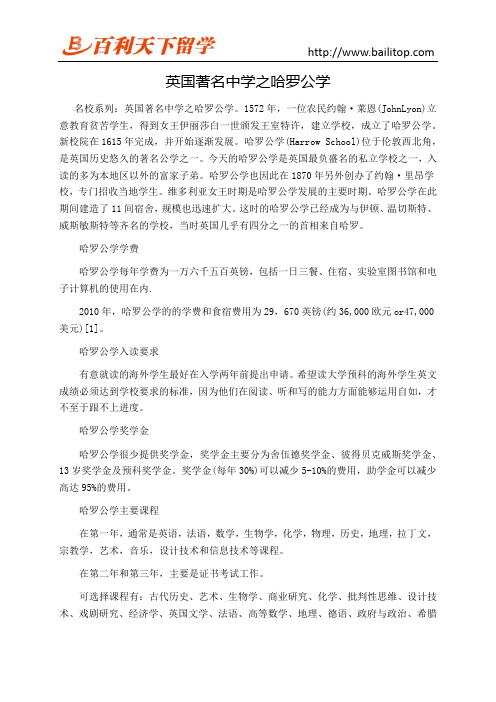
英国著名中学之哈罗公学名校系列:英国著名中学之哈罗公学。
1572年,一位农民约翰·莱恩(JohnLyon)立意教育贫苦学生,得到女王伊丽莎白一世颁发王室特许,建立学校,成立了哈罗公学。
新校院在1615年完成,并开始逐渐发展。
哈罗公学(Harrow School)位于伦敦西北角,是英国历史悠久的著名公学之一。
今天的哈罗公学是英国最负盛名的私立学校之一,入读的多为本地区以外的富家子弟。
哈罗公学也因此在1870年另外创办了约翰·里昂学校,专门招收当地学生。
维多利亚女王时期是哈罗公学发展的主要时期。
哈罗公学在此期间建造了11间宿舍,规模也迅速扩大。
这时的哈罗公学已经成为与伊顿、温切斯特、威斯敏斯特等齐名的学校,当时英国几乎有四分之一的首相来自哈罗。
哈罗公学学费哈罗公学每年学费为一万六千五百英镑,包括一日三餐、住宿、实验室图书馆和电子计算机的使用在内.2010年,哈罗公学的的学费和食宿费用为29,670英镑(约36,000欧元or47,000美元)[1]。
哈罗公学入读要求有意就读的海外学生最好在入学两年前提出申请。
希望读大学预科的海外学生英文成绩必须达到学校要求的标准,因为他们在阅读、听和写的能力方面能够运用自如,才不至于跟不上进度。
哈罗公学奖学金哈罗公学很少提供奖学金,奖学金主要分为舍伍德奖学金、彼得贝克威斯奖学金、13岁奖学金及预科奖学金。
奖学金(每年30%)可以减少5-10%的费用,助学金可以减少高达95%的费用。
哈罗公学主要课程在第一年,通常是英语,法语,数学,生物学,化学,物理,历史,地理,拉丁文,宗教学,艺术,音乐,设计技术和信息技术等课程。
在第二年和第三年,主要是证书考试工作。
可选择课程有:古代历史、艺术、生物学、商业研究、化学、批判性思维、设计技术、戏剧研究、经济学、英国文学、法语、高等数学、地理、德语、政府与政治、希腊语、历史、艺术史、意大利语、拉丁语、数学、音乐、音乐技术、摄影、体育、物理、宗教研究、西班牙语、统计。
英国十大贵族学校排名一览表

英国十大贵族学校排名一览表贵族精英教育,是英式教育的特色之一,那么你知道英国有哪些世界知名的皇家学院吗?来一起看看吧。
跟着了解一下英国十大贵族学校排名一览表。
1、伊顿公学英国乃至全球著名的贵族学校,这里曾经培养出多名的英国首相以及社会各界的知名人士,伊顿学院是一所军事化管理学校,这里有严格的管理制度,贵族礼仪式教育,被称为精英的摇篮,是英国最好的贵族学校。
2、哈罗公学学校坐落于伦敦,创建于1572年是一所历史十分悠久的学校,著名诗人拜伦,英国首相丘吉尔,约旦国王侯赛因都在这所学校毕业,学校以严格的管理制度闻名,在这里不但可以学习大量的知识,还有丰富的课外活动,而且更加着重培养学生的自信,包容,尊重等优良品格。
3、切特豪斯公学英国排名前五的贵族学校,创建于1611年,该学校学术理论十分出名,每年的学术成果在英国都是排名前茅,学校注重培养的学生的个性以及整体素质,提倡学生知识理论和心理健康全面发展。
4、威斯敏斯特皇家书院位于伦敦市中心位置,始建于1179年,由伊丽莎白一世建立,学校的入学标准十分严苛,不光需要学生的学习成绩优秀,还要考察学生的思想品德,是英国最好的私立高中。
威斯敏斯特皇家书院曾经培养出7位英国首相。
5、拉格比学校是英国历史悠久的一所学校,同时也是英国前十的贵族学校之一,1868年皇家法案钦定的九大公学之一,这里提供优质的教育,齐全的硬件设施,严格的规章制度,为学生提供精英式教育.6、什鲁斯伯里中学之一,学校创建于1552年,位于塞文河岸边,学校办学宗旨让学生成为一个独立优秀的个体,不但要有理论知识还要有动手能力,以及良好的品德,让学生更好的接受教育。
7、麦钱特泰勒斯学校之一,一所男子贵族学校,成立于1561年,学校占地面积极大,达250公顷,学校的各项指标在英国都是排名前列,而且学校师生比例高达10比1,确保每一位学生都成绩优秀。
8、圣保罗中学这是一所女子走读学校,是英国最著名的女子学校,许多影星,女经济学家等社会精英都是在这里毕业,而且这所学校至今还保持着100%的名牌大学入学率。
哈罗公学

哈罗公学哈罗公学(Harrow School)位于伦敦西北角,是英国历史悠久的著名公学之一。
它由哈罗当地的一个农民约翰·里昂于1572年创建,最初的目的是为当地的男童提供受教育的机会,但经过几百年的发展与演变,今天的哈罗公学是英国最负盛名的私立学校之一,入读的多为本地区以外的富家子弟。
哈罗公学招收年龄在13至18岁之间的男生,此外哈罗公学在曼谷还有一所哈罗国际学校,并在坦桑尼亚支持一所当地的学校。
哈罗公学在2005年在中国北京开设一所2年制高中,提供英国的A-Level课程。
维多利亚女王时期是哈罗公学(也是其他英国众多公学)发展的主要时期,英国的海外殖民在此时达到顶峰,大英帝国需要更多受良好教育的绅士们来管理这个庞大的国家。
哈罗公学在此期间建造了11间宿舍,规模也迅速扩大。
这时的哈罗公学已经成为与伊顿、温切斯特、威斯敏斯特等齐名的学校,当时英国几乎有四分之一的首相来自哈罗。
此时期的哈罗以纪律严格着称,在所有的英国公学中首创了学长制、鞭刑等体制。
与许多历史悠久的学校一样,哈罗公学也拥有自己的特殊传统。
哈罗最著名的代表是学生的硬草帽,直到今天哈罗学生在上课时还必须戴这样的帽子。
另一个特殊的传统是校歌,这在其他类似的公学中也很少见。
这些歌曲大多编写于1870年代,其中最著名的一首是《四十年来》(Forty Years On)。
歌词内容大多宣扬维多利亚时期的道德观念,但今天它们的主要功能是体现学校的传统与价值,增强凝聚力,很少人会关心这些歌词原本的含义。
哈罗公学的体育活动也很有特点,他们最独特的运动是哈罗足球(Harrow Football),这是一项介于足球和橄榄球之间的运动。
另外大多数历史学家认为,壁球最早也起源于哈罗公学。
哈罗公学著名的校友包括了诗人拜伦、英国首相温斯顿·丘吉尔、伊斯兰学者马默杜克·皮克索尔、摄影术的发明者福克斯·塔尔博特、印度领导人尼赫鲁和考古学家阿瑟·伊文思等。
unit1-neverevergiveup课文翻译
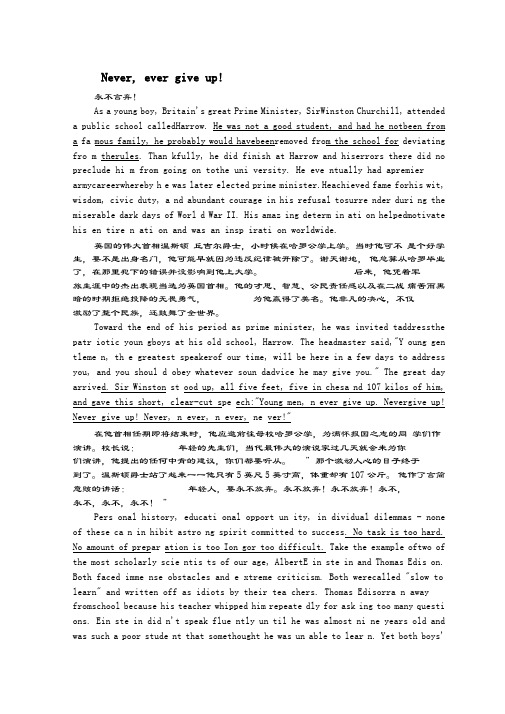
Never, ever give up!永不言弃!As a young boy, Britain's great Prime Minister, SirWinston Churchill, attended a public school calledHarrow. He was not a good student, and had he notbeen from a fa mous family, he probably would havebeenremoved from the school for deviating fro m therules. Than kfully, he did finish at Harrow and hiserrors there did no preclude hi m from going on tothe uni versity. He eve ntually had apremier armycareerwhereby h e was later elected prime minister.Heachieved fame forhis wit, wisdom, civic duty, a nd abundant courage in his refusal tosurre nder duri ng the miserable dark days of Worl d War II. His amaz ing determ in ati on helpedmotivate his en tire n ati on and was an insp irati on worldwide.英国的伟大首相温斯顿丘吉尔爵士,小时候在哈罗公学上学。
当时他可不是个好学生,要不是出身名门,他可能早就因为违反纪律被开除了。
谢天谢地,他总算从哈罗毕业了,在那里犯下的错误并没影响到他上大学。
哈罗公学规章制度
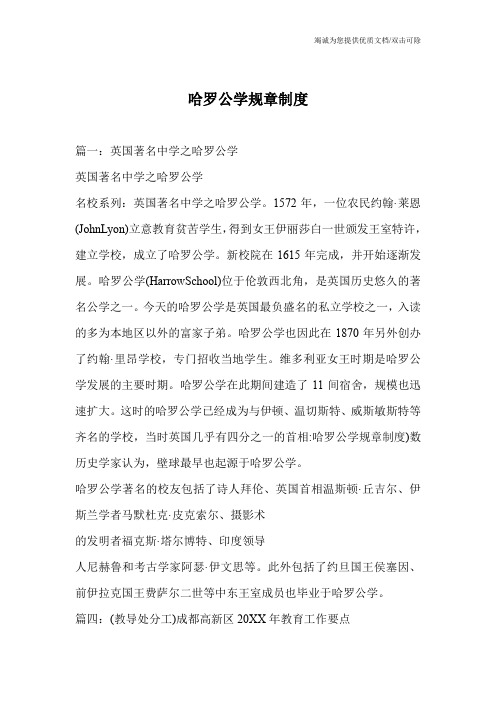
哈罗公学规章制度篇一:英国著名中学之哈罗公学英国著名中学之哈罗公学名校系列:英国著名中学之哈罗公学。
1572年,一位农民约翰·莱恩(JohnLyon)立意教育贫苦学生,得到女王伊丽莎白一世颁发王室特许,建立学校,成立了哈罗公学。
新校院在1615年完成,并开始逐渐发展。
哈罗公学(HarrowSchool)位于伦敦西北角,是英国历史悠久的著名公学之一。
今天的哈罗公学是英国最负盛名的私立学校之一,入读的多为本地区以外的富家子弟。
哈罗公学也因此在1870年另外创办了约翰·里昂学校,专门招收当地学生。
维多利亚女王时期是哈罗公学发展的主要时期。
哈罗公学在此期间建造了11间宿舍,规模也迅速扩大。
这时的哈罗公学已经成为与伊顿、温切斯特、威斯敏斯特等齐名的学校,当时英国几乎有四分之一的首相:哈罗公学规章制度)数历史学家认为,壁球最早也起源于哈罗公学。
哈罗公学著名的校友包括了诗人拜伦、英国首相温斯顿·丘吉尔、伊斯兰学者马默杜克·皮克索尔、摄影术的发明者福克斯·塔尔博特、印度领导人尼赫鲁和考古学家阿瑟·伊文思等。
此外包括了约旦国王侯塞因、前伊拉克国王费萨尔二世等中东王室成员也毕业于哈罗公学。
篇四:(教导处分工)成都高新区20XX年教育工作要点成都高新区20XX年教育工作要点(征求意见稿)20XX年,全区教育工作的总体要求是:紧紧围绕高新区三次创业总要求,坚持立德树人导向,以改革创新为统揽,以提高教育发展质量为中心,以队伍建设和学校管理为着力点,加快推进教育现代化、国际化发展,积极探索现代学校治理体系和治理能力建设,努力构建与经济社会发展相适应的高位均衡、优质特色发展教育体系。
一、坚持素质教育,全面提升教育教学质量(一)切实加强和改进德育工作。
(钟灏负责)大力开展社会主义核心价值观教育,把培育和践行社会主义核心价值观融入中小学教育全过程。
加强美育体育工作,全面实施“体育、艺术2+1项目”,开齐开足课程,促进德智体美在课程和教学层面的有机融合。
哈罗公学纪录片稿子
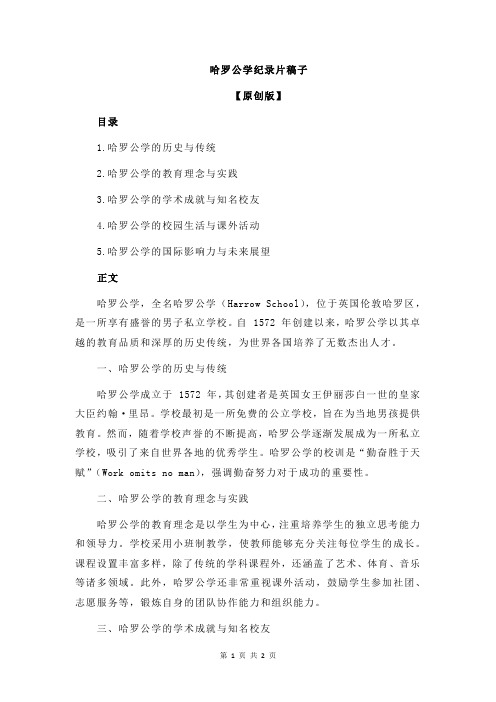
哈罗公学纪录片稿子【原创版】目录1.哈罗公学的历史与传统2.哈罗公学的教育理念与实践3.哈罗公学的学术成就与知名校友4.哈罗公学的校园生活与课外活动5.哈罗公学的国际影响力与未来展望正文哈罗公学,全名哈罗公学(Harrow School),位于英国伦敦哈罗区,是一所享有盛誉的男子私立学校。
自 1572 年创建以来,哈罗公学以其卓越的教育品质和深厚的历史传统,为世界各国培养了无数杰出人才。
一、哈罗公学的历史与传统哈罗公学成立于 1572 年,其创建者是英国女王伊丽莎白一世的皇家大臣约翰·里昂。
学校最初是一所免费的公立学校,旨在为当地男孩提供教育。
然而,随着学校声誉的不断提高,哈罗公学逐渐发展成为一所私立学校,吸引了来自世界各地的优秀学生。
哈罗公学的校训是“勤奋胜于天赋”(Work omits no man),强调勤奋努力对于成功的重要性。
二、哈罗公学的教育理念与实践哈罗公学的教育理念是以学生为中心,注重培养学生的独立思考能力和领导力。
学校采用小班制教学,使教师能够充分关注每位学生的成长。
课程设置丰富多样,除了传统的学科课程外,还涵盖了艺术、体育、音乐等诸多领域。
此外,哈罗公学还非常重视课外活动,鼓励学生参加社团、志愿服务等,锻炼自身的团队协作能力和组织能力。
三、哈罗公学的学术成就与知名校友哈罗公学在学术方面的表现一直非常优秀,其毕业生在历年的英国高考(A-level)中成绩斐然。
学校培养出了许多著名校友,如英国诗人拜伦、英国首相丘吉尔、印度国父尼赫鲁等。
此外,哈罗公学还为英国的政治、经济、文化等领域输送了大量的人才。
四、哈罗公学的校园生活与课外活动哈罗公学的校园生活丰富多彩,学生可以在课余时间参加各种兴趣小组和社团活动。
学校拥有完善的体育设施,包括足球场、篮球场、网球场等,鼓励学生积极参加体育锻炼。
此外,哈罗公学还设有艺术中心、音乐学院等,为学生提供良好的艺术氛围。
五、哈罗公学的国际影响力与未来展望作为一所世界知名的私立学校,哈罗公学在全球范围内具有广泛的影响力。
英国留学著名公学-哈罗、伊顿

英国留学著名公学-哈罗、伊顿在英国首都伦敦,偶然可以看到这么一群年轻的男生,他们身穿雪白的衬衣,外着天蓝色的西装外套,英俊潇洒,自信十足。
更引人注目的是人人头上那顶带着深蓝丝带的英式硬草帽(有时候会是黑礼服配英式高礼帽及手杖),这群孩子必定来自著名的哈罗公学(Harrow School)。
维多利亚时代的英国先贤恐怕很难预料到,他们曾经创造的工业文明的各种品牌,已经一个又一个落入德国、中国乃至印度人之手。
但是作为英帝国黄金时代象征的一个软标志—教育,倒是依旧声名显赫,吸引各种精英学子、王子皇孙、富家贵胄慕名而来,为英国带来滚滚财源。
除了牛津、剑桥一类的传统大学,很多人也把目光早早瞄向了如哈罗公学一类的贵族中学。
因为一旦能够成功入读这类顶级学校,不但意味着获得了进入牛津、剑桥等名校的敲门砖,也意味着自己的子女能够接受最正统全面的英式贵族教育,有望成为正宗的“英伦贵族”。
哈罗公学,是这类贵族学校中的佼佼者,英国贵族教育体系中的明珠。
即使面临数万英镑一年的高昂学费,世界各地那些腰缠万贯的家长,依然想尽办法让自己的儿子(女儿是不行的,因为哈罗是男校)戴上那顶哈罗草帽。
对他们来说,或许只要哈罗公学愿意接受,金钱不是问题。
赋予哈罗公学神秘光环的,不仅有辉煌的历史与传统,也有大英帝国依旧耀眼的软实力残光。
不允许说英语,射箭是必须的多少有点讽刺的是,哈罗公学的创始人,既不是声名显赫的公爵,也不是名留青史的主教。
1572年,一名哈罗本地的富农,约翰·利昂从英格兰女王伊丽莎白一世那里获准在当地建立一所面向本地农民孩子的学校。
作为代价,他出钱支付了两名学生未来去牛津和两名学生去剑桥学习的费用,并修筑了连接伦敦和埃德加的公路。
尽管来读书的都是本地教区的孩子,利昂还是制定了严格的规则,其中要求学校的校长必须由一位至少有20英镑年收入、硕士学历的人士担任,副校长的要求则是15英镑年收入和学士学历。
除了每周四外,学生没有玩乐的时间。
- 1、下载文档前请自行甄别文档内容的完整性,平台不提供额外的编辑、内容补充、找答案等附加服务。
- 2、"仅部分预览"的文档,不可在线预览部分如存在完整性等问题,可反馈申请退款(可完整预览的文档不适用该条件!)。
- 3、如文档侵犯您的权益,请联系客服反馈,我们会尽快为您处理(人工客服工作时间:9:00-18:30)。
Songs have been an important part of Harrow life. Songs are sung by the whole school to auder pupils of the school, and guests of honour that have, in the past, included members of the royal family and representatives from previous governments. The song Forty Years On has become known as the school song.
the school in its current form was founded in February 1572 under a Royal Charter granted by Queen Elizabeth I to John Lyon, a local wealthy farmer
Boys at Harrow have two uniforms. Everyday dress, worn to most lessons, consists of a white shirt, black silk tie, light grey trousers, black shoes, an optional blue jumper ,a dark blue woolen uniform jacket known as a "bluer", the option of the school blue and white scarf and dark blue woollen overcoat similar to the bluer on cold days the Harrow Hat, often erroneously called aboater
Another notable feature of the uniform at Harrow is that there is a separate set of sports uniform of the house colours. These include football shirts, socks, and a rugby shirt. This distinguishes members of different houses, and shows the house spirit within Harrow.
